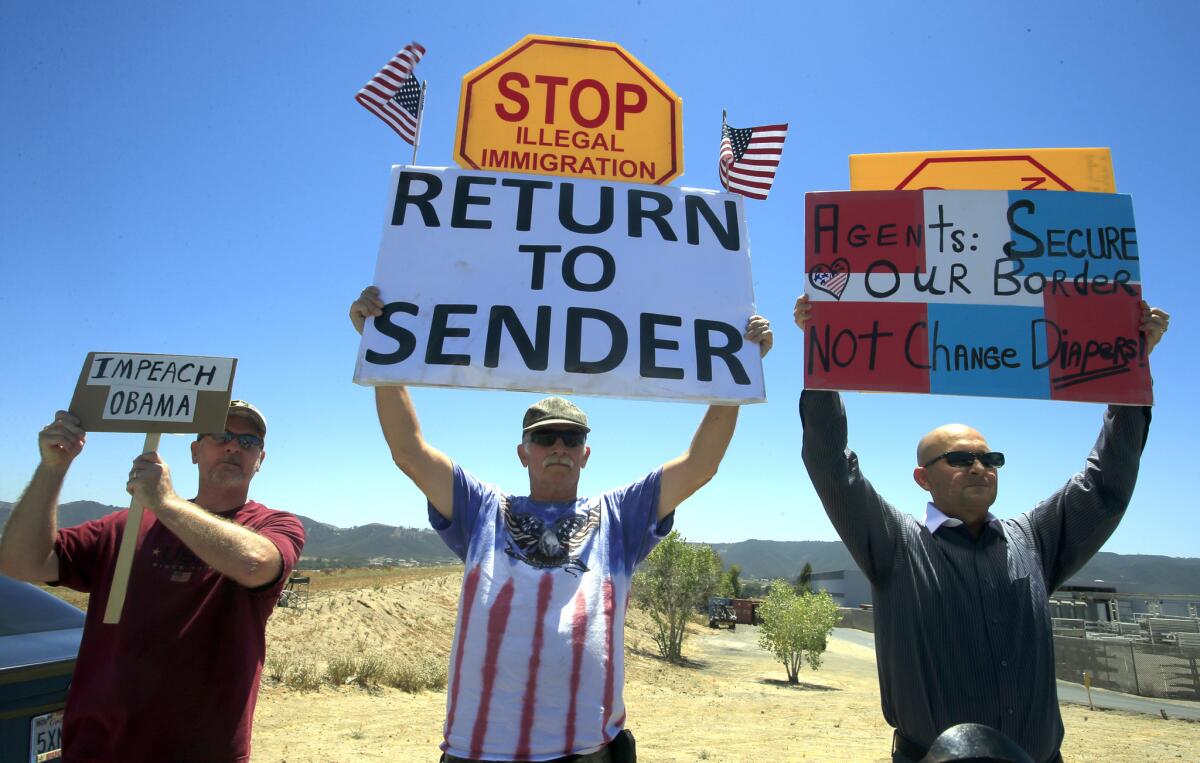U.S. to allow some immigrant deportees to return under settlement

Homeland security officials will not use threats and intimidation against immigrants facing possible deportation, and will allow some â perhaps thousands â with ties to Southern California to return under an agreement announced Wednesday.
The government admitted no wrongdoing in the settlement, which came in response to an ACLU lawsuit filed last year, but it agreed to take several measures to protect migrantsâ rights.
The agreement covers only Southern California, but some of the reforms in the deportation process are likely to be adopted nationwide, U.S. Immigration and Customs Enforcement officials said.
It was unclear how many people might be allowed to return under the agreement, but advocates estimated that it would be a small fraction of the 250,000 deported voluntarily from Southern California between 2009 and 2013, the period covered in the lawsuit.
Although critics called Wednesdayâs announcement yet another Obama administration move to mollify immigrant advocates at the expense of border security, American Civil Liberties Union leaders said the changes would result in a fair process that protects immigrantsâ rights.
âThis is a historic settlement that will end a practice that tears families apart,â said Norma Chavez Peterson, executive director of the ACLU of San Diego and Imperial counties.
In its lawsuit, the group alleged that federal agents in recent years had turned to intimidation, threats and misinformation to persuade immigrants in this country illegally to agree to voluntary deportation. Many deportees were longtime California residents with no serious criminal records who didnât know that they could challenge their deportations in court, according to the lawsuit.
Among the reforms the settlement requires: Federal agents will be prohibited from using threats or pressure. They must advise people of their right to a hearing and provide them access to an informational hot line and a list of free legal service providers.
The settlement also calls for the United States to launch an outreach effort through Mexican media, aimed at informing deportees that they may be eligible to return if they are part of the settlement class.
Homeland security officials said in a statement that coercion and deception by the two agencies that handle most removal proceedings, ICE and Customs and Border Protection, are ânot tolerated.â
âIn an effort to address the issues raised in this litigation, both agencies have agreed to supplement their existing procedures to ensure that foreign nationals fully comprehend the potential consequences of returning voluntarily to Mexico,â the statement read.
The class of deportees who qualify for repatriation is limited mainly to longtime California residents with relatives who are U.S. citizens and to young migrants whose parents brought them into the country illegally.
The number of repatriations could reach into the hundreds or thousands, said Sean Riordan, senior staff attorney at the ACLU office in San Diego. All of those repatriated are potentially subject to deportation proceedings when they return.
So far, eight deportees have returned to California from Mexico, including 51-year-old Isidora Lopez-Venegas, who was deported after being stopped on the street in San Diego while walking with her U.S.-born children. She said agents threatened to place her autistic son in a foster home if she didnât agree to be deported.
In Mexico, Lopez-Venegas said during an ACLU news conference Wednesday in San Diego, she met other deportees with similar tales. âI became aware that there are many in my situation. Itâs very sad.â
Critics called the settlement the latest in a series of policy shifts from the Obama administration designed to appease migrant rights groups. Some border agents dispute allegations of widespread abuse, saying homeland security officials are undermining their mission by allowing deportees to return to the U.S.
âAt every turn, theyâre tying our hands,â said Gabe Pacheco, a spokesman for the National Border Patrol Council, the union representing border patrol agents.
The Obama administration in recent years has worked to demonstrate its commitment to border security. Migrant advocates argue that agents resorted to abusive tactics to satisfy deportation quotas.
Among those represented in the ACLU lawsuit was a grandmother who was deported after being arrested at a bus stop and allegedly tricked into signing an English form that she couldnât read. One man said he was falsely told that his visa petition had been lost.
Many others werenât informed that once they left the U.S. voluntarily, they would be barred from returning for 10 years, the ACLU said.
âWe kept hearing story after story from people ⌠who had deep family ties, no serious criminal history â everything to lose by taking voluntary departure â who had been pressured into taking this instead of having their day in court,â Riordan said.
[email protected]
Twitter: @ricardin24
More to Read
Sign up for Essential California
The most important California stories and recommendations in your inbox every morning.
You may occasionally receive promotional content from the Los Angeles Times.











